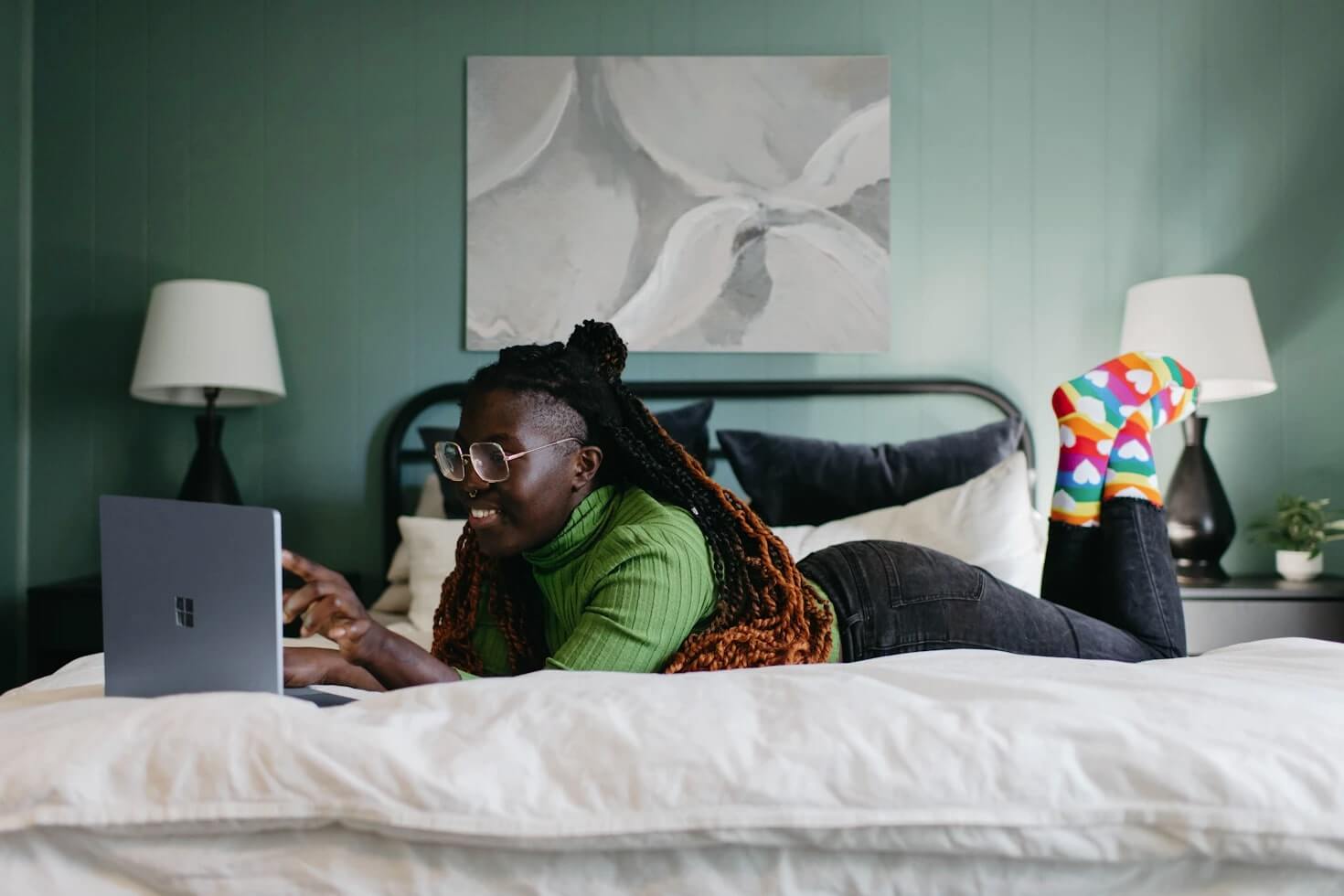How To Follow Up On a Job Application (+ Not Get Ghosted)
Don’t know how to follow up on a job application without being pushy? Use our expert tips & templates to snag that remote interview!

You crafted the perfect resume, aced your cover letter, and filled out the seemingly never-ending application for your dream remote job. So, now what?
Most people sit back and wait for hiring managers to make first contact. Others forget about their applications and continue applying to anything else they may be qualified for. But you?
You’re going to follow up on that remote job application. Because when done right, a well-timed follow-up strategy displays the professional persistence and genuine interest hiring teams are looking for.
So let’s brainstorm a game plan to get yourself out of the “Applied” stack and into the “To Interview” pile. We’ll start with a few reasons why this step is worth your time.
Don’t Get Ghosted; Stand Out With a Follow-Up 👻
If you think following up on a job application makes you seem annoying or gives you creepy stalker vibes, the truth couldn’t be further from your fears. When you follow up on a remote job you really want:
- It’s like adding glitter to your application. Your follow-up can include details you couldn’t include in your resume and cover letter, helping you shine brighter and stand out. Showing off your stellar communication skills doesn’t hurt either.
- It politely reminds hiring teams that you exist (in a good way!). Hiring managers are ultra busy. Each open position receives an average of 250 applicants, and companies typically hire for more than one role at a time. A follow-up shows you’re not just another applicant but a pro with initiative they should get to know.
- It reinforces your interest in the position/company. Use this opportunity to make a genuine connection with a hiring manager and prove you’re worth considering. That’s the very opposite of spamming out resumes en masse, hoping something sticks (not a good look).
- It opens the door for quiet hiring. Let’s say you’re ultimately not the right fit for this role (sorry). A well-crafted follow-up will keep you in the running for future opportunities you may be perfect for.
There’s no downside to following up on a remote role. Worst case scenario? You only hear crickets. But that might have happened had you done nothing anyway.
Best case? You actually land a virtual interview. Pretty low-risk/high-reward odds, especially with our easy-peasy action plan.
How To Follow Up On a Job Application & Jump To The Interview Stage 🚀
Don’t let your application get stuck on Read. Follow these tips to double your interview chances:
Timing Is Everything
Every company has its own hiring timeline. Check and decode the job posting for an estimated timeframe or politely ask during the application process. Only follow-up after that time.

No intel on timeframes? Wait 5–10 business days after the application deadline to follow up. Any sooner, and you may come across as pushy or (worse) desperate.
This gives the team time to review all submitted applications. It also shows that you’re patient and an expert in asynchronous communication (a valuable remote work skill!).
The timing of your message is also crucial. Avoid Mondays and Fridays when inboxes are typically overflowing and your message may go unnoticed. Aim for mid-week mornings when people are more likely to be focused and open to conversation.
Read the Room
Crafting a killer follow-up message requires an understanding of your reader. So research the company culture and the hiring manager specifically to give you an idea of what to say.
Check out the About Us page on the company’s website, browse their social media channels, and scout employee profiles on LinkedIn.
Are they casual, quirky, and fun? Keep your tone light. More traditional? Maintain professionalism (and skip the emojis).
Choose Your Follow Up Method Wisely
During your research, you may come across the company’s preferred communication method (email, direct message, website contact form, carrier pigeon?). Follow this guideline so they know you can follow directions.
No clues? Email is usually a safe contact method. Try to find the hiring manager’s email first. If you luck out, try a director or manager in the department you’re applying for. A general email works better than nothing as a last resort.
A LinkedIn message may also be appropriate, depending on the company culture and your comfort level.

Follow them, engage with their posts, and share content relevant to your expertise and the position you applied for. Avoid being salesy or pushy, minimize self-promotion, and try to subtly highlight your interest in the company.
Avoid cold calling unless you have a strong reason to do so (like if you’re following up on a previous conversation or voicemail). Be polite, brief, and leave a clear voicemail with the best time to reach you if no one answers.
Always Personalize Your Messages
Like resumes, all emails and direct messages should be tailored to each recipient and company. That means addressing each recipient by name and adding specific details to personalize your message for that person.
For example, don’t send the same basic message to the hiring manager and the department director. Customize each message to show you’ve done your homework and made the extra effort.
Personalization increases your chances of getting your message read and replied to while decreasing your odds of winding up in a spam folder.
Use an Attention-Grabbing Subject Line for Your Message
Ditch the generic “Application for [Job Title]” snoozefest. Strive for engaging and click-worthy. You want your message to jump out of their inbox and pique their curiosity.
To do this, craft a short, attention-grabbing subject line that mentions the role and highlights your unique value proposition. Consider examples like:
- [Your Name] - [Your Skill] Pro Ready To Tackle [Work Challenge]
- Python Guru Eager To Code for [Company Name]
- [Current Title] Excited To Contribute To [Company Name]’s Success!
- Solving Your [Pain Point] with [Your Skills]: Following Up on [Job Title]
- [Something You Learned About the Company] + [Your Skills] = Perfect Match
- Coffee Break & Chat About the [Job Title] Role?
- [Your Name] - Eager to Learn More About [Job Title] Opportunity
Keep The Body of Your Message Short and Sweet
Long, generic emails or direct messages are where excitement goes to die. So keep your messages clear, concise, and engaging.
Remember, after your cover letter and resume, a follow-up is your last chance to make a memorable first impression and genuine connection with a hiring manager — so don’t waste it!

If you’re paralyzed by Blank Page Syndrome, use these routes for inspiration:
- Add a new, unique value proposition. Recently complete an online course relevant to the position? Launch a new portfolio showcasing your talent? Share it! Briefly reiterate your interest in the role and make sure hiring teams have this info to strengthen your application.
- Highlight something you recently learned about the company that resonates with you. Did they just announce a new product or project? Unveil a new partnership with a charity you volunteer for? Show you’re aligned with their company culture and values.
- Ask a thoughtful question related to the role or company. This proves you’re interested and engaged. Answering may also give your recipient another reason to reply.
- Give them a friendly nudge to review your documents. Ask if there’s anything else you should do to overcome any hesitations, concerns, or questions they may have about interviewing you. Mention that you’re happy to provide any additional information or answer any questions they may have.
Close With a Clear Call To Action
Don’t fade out into the ether. End your message with a solid call to action that motivates your reader to follow through on your goal. Express your availability for an interview and thank them for their time.
Here are a few examples to keep in your back pocket:
- I’m available for a quick call [this or next week] to discuss my qualifications further. Would [date/time] work for you?
- Would you be available for a brief chat to explore [what was mentioned in the body of your message] further?
- I’ve attached a [sample, portfolio link, etc.] demonstrating my [relevant skill] for your review. I look forward to discussing how to use my skills to contribute to [Company Name]’s success!
Bonus points: Use Canva to create a visually appealing email signature that reflects your personal brand and leaves a memorable impression.
Proofread Your Message Like Your Future Self Depends On It
Typos are the ultimate dealbreaker.
So read over your message, run it through a free proofreader like Grammarly, and then do something else for 10 minutes. Walking away from your message gives you time to step back and spot errors you may have overlooked before.

Consider sending your message to a trusted friend or colleague for a second set of eyes too. You want to catch those pesky typos before they haunt you later.
Be Patient and Persistent But Not Pesky
Even the best follow-ups won’t guarantee an immediate response. But be patient. If you don’t hear back after a week or two, consider sending another brief email reiterating your interest.
Two follow-ups are more than enough. Avoid bombarding hiring teams with more messages, or you’ll come across as frantic, aggressive, or overconfident.
Psst! Save These Follow-Up Templates To Land Your Dream Remote Job! 📝
There’s no need to reinvent the wheel here. Just like you leverage cover letter and resume builder templates, you can use our starting point to customize your perfect follow-up message with your unique flair.
Job Follow-Up Email Template
Subject: [Your Name] - [Skill] Pro Ready To Tackle [Work Challenge]
Dear [Hiring Manager Name],
I hope this email finds you well. I’m writing to follow up on my application for the [Job Title] position I submitted on [date].
I’m particularly excited about [specific aspect of the job/company that resonates with you] and believe my [specific skill] and [specific experience] will be a valuable asset to your team. Also, [mention something new/relevant to the position, ask a question, etc.].
I understand you’re reviewing many applications, but I’m confident my qualifications align perfectly with your needs. Would you be available for a quick call to discuss how I can contribute to your team’s success?
Thank you for your time and consideration. I look forward to hearing from you soon!
Sincerely,
[Your Name]
[Contact Details]
LinkedIn Job Follow-Up Message
Hi [Hiring Manager Name],
I hope this message finds you well. I’m [Your Name], and I recently applied for the [Job Title] position on [date].
I’m particularly interested in [specific aspect of the job/company that resonates with you] and believe my experience in [relevant experience] will be valuable to your team.
I’ve also been working on [relevant skill related to the job], which you can find samples of here: [link to online portfolio, blog, etc.].
Would you be open to connecting for a quick chat to discuss my qualifications further?
Thank you for your time and consideration. I look forward to our conversation!
Best regards,
[Your Name]
Now Go Get That Remote Job, Tiger! 🙌
Following up on an application is a strategic way to stand out in the competitive remote job market. By being respectful, professional, and creative, you can increase your chances of scheduling an interview, landing that dream gig, and reaching your remote career goals!
It’s said that what is meant for you will not pass you. So if this team doesn’t snatch you up, it’s their loss. There are plenty of remote jobs in the sea — especially on itjobsfromhome.com, the number one destination for finding the top remote jobs around the world.